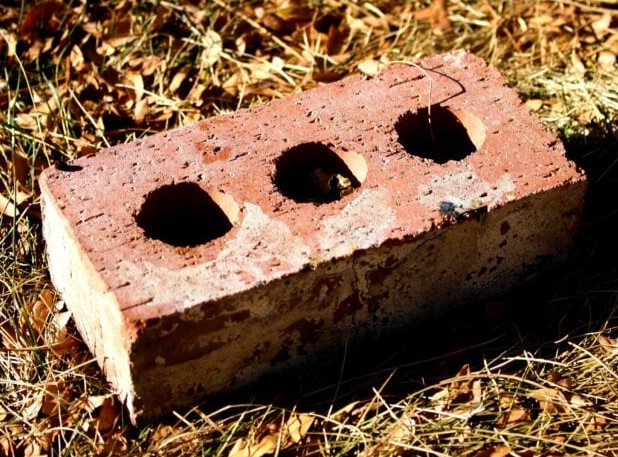Everyday workers starting to get ahead? Inflation alarming those with means? Time to hit the economy with a brick!
Unless you’re so wealthy that you can afford not to know or care how much things cost, chances are you’ve felt the pain of higher prices this year. Despite most causes of inflation being out of the government’s control, it’s still a top issue for many voters going into tomorrow’s midterm elections. How is the Fed rate hike expected to help the situation, though? Could the cure be worse than the disease? And who stands to gain?
First, it’s critical to realize that we’re not the only country being affected. Inflation is a problem all over the world. More in some countries, less in others, but with so many global causes, it’s hard to pin all of it on “Let’s Go, Brandon.”
Supply chains are still broken from the pandemic (and ongoing virus outbreaks and disability, since “slowing the spread” seems to be forgotten nowadays). Trade won’t get back to “normal” as long as disruptions continue, and between disease, natural disasters, war and politics, we are headed into a future of plentiful disruptions.
Higher transportation costs raise the price of anything that is shipped. As rivers dry up around the world, they become too shallow to serve as shipping corridors. The cost of sending agricultural commodities down the Mississippi has doubled and tripled in the last year. We’re also in the midst of a diesel shortage, due to seasonal variation, the Ukraine war, and a lack of American refinery capacity as they close due to unprofitability and accidents.
Then there are the Trump era tariffs, which are mostly still in place. Remember that extra money we pay for certain imported goods, thereby making America great again? Turns out, those tariffs mean higher prices, lost jobs, pain for the agricultural sector, and a death spiral for industries who can’t export as much inventory due to retaliatory tariffs, and therefore don’t invest as much in future production.
Corporations have also taken advantage of the situation to pad their own bottom line while blaming external costs. Some companies raise prices during inflationary surges, and then decline to lower them afterward. Others charge more than they need to, leading to record profits and stock buybacks. In a free market, they’re allowed to charge whatever people will pay, right? Yay, Capitalism.
Mostly, though, it’s about the intersection of “less stuff” and “more cash.” Whether supplies are limited due to shipping bottlenecks, supply chain dysfunction, natural disasters, policy choices or resource depletion, there just isn’t enough stuff to go around, and prices will go up as scare goods are rationed by people’s ability to pay for them. Many people are also sitting on pandemic savings, providing a cushion. The strong jobs market and rise in hiring that came as people decided that their own entrepreneurial efforts are more fruitful than laboring for someone else (or, more bleakly, as people died or became too disabled from Long COVID to work anymore) also drew in more workers with higher wages (more money to spend).

Serious inflation scares people, though. Visions of “wheelbarrows full of cash” to buy loaves of bread and mentions of “Weimar” dance in their heads (although the real disaster in Germany was deflation). People with power (money is power) start nudging the government to Do Something. Usually, that “something” is to hit the economy on the head with a brick.
The Federal Reserve is responsible for keeping inflation within certain acceptable parameters (about 2% per year). However, the tools they can use to accomplish this are pretty sparse. They can buy and sell financial instruments, which is why they temporarily bought a bunch of securities from banks after the 2007 crash and Great Recession, when the problem was not enough money circulating in the economy. The other thing they can do is tinker with interest rates, which is what they’re doing these days. See, in 2008, we needed to be pulled out of a recession. Now, it’s apparently time to create one.
Raising the interest rate makes it more expensive to borrow money. That cuts down on the amount of money chasing goods and services, which means less inflation. It also means fewer jobs, more desperate workers willing to work for lower wages, smaller raises (if any), layoffs, deferred families and home purchases, and misery. Pain falls on the poorest first, of course, as they are the ones with the least money saved, more debt, and marginal living situations.
Already, companies like Lyft and Amazon are laying off workers, or declining to hire more. “Less hiring and lower wages are top ways the majority of companies say they plan to recoup the lost business margin,” CNBC reports. With savings high, the unemployment rate still stubbornly low, and hiring still brisk in places, the Fed is going to have to hit the economy harder to cause enough misery to lower prices, though. Esther George, President of the Federal Reserve Bank in Kansas City, straight up admitted as much to NPR last week. “We see today that there is a bit of a savings buffer still sitting for households, that may allow them to continue to spend in a way that keeps demand strong,” she said. “That suggests we may have to keep at this for a while.”
All of which brings us to another side effect of a recession. Sure, people have less money, lose their jobs, maybe end up homeless, all so prices can come down a bit. But look on the bright side! When desperate people sell their homes, cars, businesses, and other assets on the cheap, wealthier people can swoop in and pick up those assets at fire sale prices. Recessions are an effective way to concentrate wealth at the top again, if by chance there are too many people like you and me finding good jobs with livable wages. Can’t let that happen, can we?
So, let’s recap. Inflation, while real and global, is also an excuse for companies to pad prices in ways that balloon the bottom line. Once they have to share those gains with workers, it’s time to engineer a recession, which allows them to cut jobs and pay, while making it harder for the average person to afford a home (or even live in one). The people at the bottom are squeezed until their savings and assets trickle back upward again. This is considered a successful intervention, as long as it slays inflation. Instead of everybody having to pay more, we sacrifice some people so others can pay less.
The fact that Capitalism breaks when enough people get the slightest bit ahead sure is telling, isn’t it?
Related: Squeezed: Affording Kids in this Economy


Join the conversation!